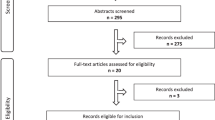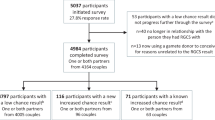Abstract
Through carrier screening couples at-risk of conceiving a child with an autosomal recessive or X-linked condition can be identified prior to conception. The aim of this study was to assess knowledge, attitudes and preferences regarding reproductive genetic carrier screening (RGCS) among reproductive-aged men and women in Flanders (Belgium). Women and men of reproductive age visiting their pharmacist were invited to answer a self-administered questionnaire. Prior to filling in the questionnaire, participants were asked to read an information leaflet explaining some key concepts about RGCS. Our sample included 387 individuals of reproductive age, of which 68.5% were female and 31.5% were male. Most of the participants were below 34 years old (72.9%), didn’t have children (68.6%) and were currently in a relationship (69.1%). Offering RGCS to couples that want to have children was found acceptable by 86% of participants. However, fewer participants would consider RGCS for themselves in the future (61%). We observed a positive correlation between attitude score/knowledge score and the intention to have RGCS. Half of the participants (50.9%) preferred the disclosure of individual test results. Most of participants indicated that RGCS should be offered through the gynecologist (81.1%), followed by the GP (71.5%) and the Centre for Human Genetics (64.8%). About 68.9% of participants were willing to pay out-of-pocket for an RGCS test. We recommend that RGCS should ideally be implemented through a tailored implementation strategy whereby individual needs and preferences can be taken into account.
This is a preview of subscription content, access via your institution
Access options
Subscribe to this journal
Receive 12 print issues and online access
$259.00 per year
only $21.58 per issue
Buy this article
- Purchase on SpringerLink
- Instant access to full article PDF
Prices may be subject to local taxes which are calculated during checkout
Similar content being viewed by others
Data availability
All data generated or analysed during this study are included in this published article [and its supplementary information files].
References
Henneman L, Borry P, Chokoshvili D, Cornel MC, van El CG, Forzano F, et al. Responsible implementation of expanded carrier screening. Eur J Hum Genet. 2016;24:e1–e12.
Morris JK, Law MR, Wald NJ. Is cascade testing a sensible method of screening a population for autosomal recessive disorders? Am J Med Genet A. 2004;128A:271–5.
Archibald AD, Smith MJ, Burgess T, Scarff KL, Elliott J, Hunt CE, et al. Reproductive genetic carrier screening for cystic fibrosis, fragile X syndrome, and spinal muscular atrophy in Australia: outcomes of 12,000 tests. Genet Med. 2018;20:513–23.
Delatycki MB, Alkuraya F, Archibald A, Castellani C, Cornel M, Grody WW, et al. International perspectives on the implementation of reproductive carrier screening. Prenat Diagn. 2020;40:301–10.
Best S, Long J, Theodorou T, Hatem S, Lake R, Archibald A, et al. Health practitioners’ perceptions of the barriers and enablers to the implementation of reproductive genetic carrier screening: a systematic review. Prenat Diagn. 2021;41:708–19.
Braithwaite J, Marks D, Taylor N. Harnessing implementation science to improve care quality and patient safety: a systematic review of targeted literature. Int J Qual Health Care. 2014;26:321–9.
Van Steijvoort E, Devolder H, Geysen I, Van Epperzeel S, Peeters H, Peeraer K, et al. Expanded carrier screening in Flanders (Belgium): an online survey on the perspectives of nonpregnant reproductive-aged women. Per Med. 2021;18:361–73.
Tavakol M, Dennick R. Making sense of Cronbach’s alpha. Int J Med Educ. 2011;2:53–5.
van Dijke I, Lakeman P, Sabiri N, Rusticus H, Ottenheim CPE, Mathijssen IB, et al. Couples’ experiences with expanded carrier screening: evaluation of a university hospital screening offer. Eur J Hum Genet. 2021;29:1252–58.
Bell CJ, Dinwiddie DL, Miller NA, Hateley SL, Ganusova EE, Mudge J, et al. Carrier testing for severe childhood recessive diseases by next-generation sequencing. Sci Transl Med. 2011;3:65ra4.
Mello S, Stifano S, Tan AS, Sanders-Jackson A, Bigman CA. Gendered Conceptions of Preconception Health: a thematic analysis of men’s and women’s beliefs about responsibility for preconception health behavior. J Health Commun. 2020;25:374–84.
Almeling R, Waggoner MR. More and less than equal: how men factor in the reproductive equation. Gend Soc. 2013;27:821–42.
Johnston J, Zacharias RL. The Future of reproductive autonomy. Hastings Cent Rep. 2017;47:S6–S11.
Robson SJ, Caramins M, Saad M, Suthers G. Socioeconomic status and uptake of reproductive carrier screening in Australia. Aust Nz J Obstet Gyn. 2020;60:976–9.
Nijmeijer SCM, Conijn T, Lakeman P, Henneman L, Wijburg FA, Haverman L. Attitudes of relatives of mucopolysaccharidosis type III patients toward preconception expanded carrier screening. Eur J Hum Genet. 2020;28:1331–40.
Acknowledgements
The authors would like to express their gratitude to all pharmacies throughout Flanders that allowed our research team to recruit potential participants in their pharmacies. Furthermore they would like to thank all participants that took a moment of their time to complete our questionnaire.
Funding
This project was financially supported by the Research Fund Flanders (FWO).
Author information
Authors and Affiliations
Contributions
EVS, HD, IG, SVE and PB designed the study. The data-collection was carried out by HD, IG, SVE and EVS. The data-analysis was performed by EVS. A first draft of the manuscript was written by EVS and critically discussed and revised by HD, IG, SVE, PB, HP, KP and GM. PB coordinated the study. All the authors have approved the final version.
Corresponding author
Ethics declarations
Competing interests
The authors declare no competing interests.
Ethical approval
The study protocol received ethical approval from the Research Ethics Committee UZ/KU Leuven (MP010414). The questionnaire was anonymous and participation was voluntary.
Additional information
Publisher’s note Springer Nature remains neutral with regard to jurisdictional claims in published maps and institutional affiliations.
Supplementary information
Rights and permissions
About this article
Cite this article
Van Steijvoort, E., Devolder, H., Geysen, I. et al. Knowledge, attitudes and preferences regarding reproductive genetic carrier screening among reproductive-aged men and women in Flanders (Belgium). Eur J Hum Genet 30, 1255–1261 (2022). https://doi.org/10.1038/s41431-022-01082-1
Received:
Revised:
Accepted:
Published:
Issue date:
DOI: https://doi.org/10.1038/s41431-022-01082-1
This article is cited by
-
Experiences of nonpregnant couples after receiving reproductive genetic carrier screening results in Belgium
European Journal of Human Genetics (2023)
-
Educational tools support informed decision-making for genetic carrier screening in a heterogenic Israeli population
Journal of Community Genetics (2023)
-
Genome sequencing—do you know what you are getting into?
European Journal of Human Genetics (2022)



